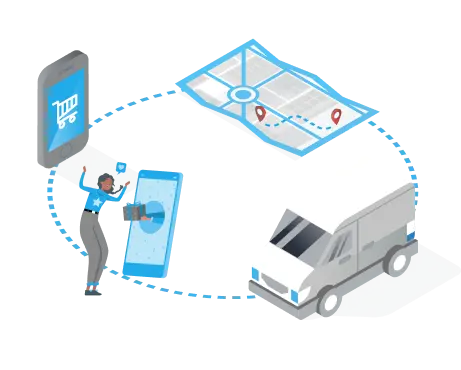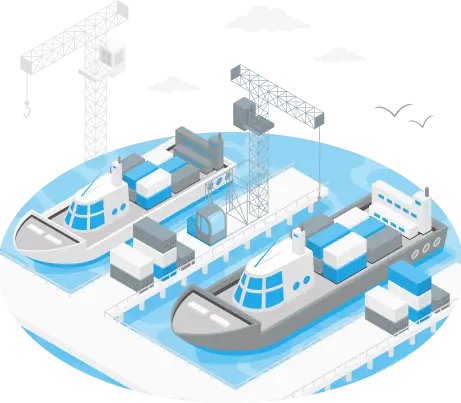How Digitalization is Changing the shipping industry?
Short Description
In today’s digitally advanced world, the shipping industry is undergoing a significant transformation through digitalization. As global trade continues to expand, shipping companies are embracing digital technologies to revolutionize their operations. This blog explores the impact of digitalization on the shipping industry, highlighting its role in boosting productivity, improving supply chain visibility, and fostering new avenues for growth and innovation. From streamlining operations and enhancing efficiency to harnessing the power of blockchain, IoT, and autonomous technologies, we delve into the benefits and opportunities that digitalization brings to shipping businesses. Join us as we uncover the key aspects of digital transformation in the shipping industry and its potential for shaping the future of global trade.
Introduction
In today’s technologically advanced world, digitalization has become a catalyst for change across many industries, including the transportation sector. As global trade expands, shipping companies are utilizing digital technologies to transform their business models. This blog explores the ways in which digitalization is transforming the shipping industry, enhancing productivity, improving supply chain visibility, and generating new possibilities for growth and innovation.

Streamlining Operations and Increasing Efficiency
Digitization has had a considerable positive impact on the maritime industry’s operational effectiveness. The development of e-commerce and the subsequent increase in
online shopping has necessitated the need for delivery systems that are quicker and more dependable. Thanks to the introduction of digital technologies, shipping companies can now provide real-time tracking, optimize routes, and provide consumers with accurate delivery
forecasts. This level of transparency and efficiency has revolutionized last-mile delivery, resulting in on-time deliveries and greater customer satisfaction.
Enhanced Supply Chain Visibility with Blockchain
Blockchain is among the most revolutionary technologies in the shipping sector. By utilizing blockchain, shipping firms can safely communicate and track data
along the supply chain, minimizing bureaucracy, eradicating fraud, and boosting stakeholder trust. Transparency and accountability are maintained
throughout the shipping process because of the immutable and tamper-proof recording of every transaction.


Utilizing IoT’s Power for Smarter Operations
The Internet of Things (IoT), which enables real-time monitoring and data-driven decision-making, has made smart shipping conceivable. IoT sensors
can be installed on ships, containers, and cargo, giving transportation companies access to vital data on things like temperature, humidity, and security. Route optimisation, predicting maintenance needs, and assuring the security of cargo while in transit can all be done with the help of this
information. The Internet of Things-enabled smart shipping solutions encourage financial savings, operational efficiency, and environmental
sustainability.
Embracing Autonomous Technologies

Digitalization has opened up new opportunities for drones and autonomous ships in the shipping industry. Unmanned surface boats (USVs) and autonomous underwater vehicles (AUVs) can perform tasks including surveying, cargo inspection, and environmental monitoring with the help of cutting-edge navigation and communication technologies. Additionally, distribution to ships, surveillance, and environmental monitoring are all done with drones. By reducing the need for human labour and enabling remote operations, autonomous technologies improve effectiveness, safety, and cost effectiveness.
For businesses in the shipping industry, it is essential to explore and utilize the benefits of digitalization to stay competitive and thrive in the evolving landscape. By adopting technologies such as blockchain, IoT, and autonomous systems, shipping companies can gain advantages such as improved operational efficiency, increased supply chain visibility, and enhanced customer satisfaction. Embracing digital transformation can lead to new opportunities for expansion, innovation, and overall growth.
We, at Webosmotic, have been working closely with shipping businesses like ShipTime and ParcelPort to assist them in their digitalization journey. By leveraging our expertise and innovative solutions, we have helped these companies transform their processes and unlock the best benefits of digitalization.
For ShipTime, we’ve implemented real-time tracking, route optimization, and
improved last-mile delivery. This has streamlined their operations, reduced
delivery times, and enhanced customer satisfaction.


ParcelPort has experienced significant improvements in supply chain management through our use of blockchain technology. This has enhanced visibility, trust, and streamlined processes.
If your shipping business is seeking to digitize its processes and gain the best benefits, we
would be delighted to explore how Webosmotic can assist you on this transformative path.
Together, we can optimize your operations, enhance customer experiences, and unlock new
opportunities for growth and innovation in the digital era of shipping.
Transform your shipping business with WebOsmotic
Key Takeaway
- The maritime sector is undergoing a revolution as a result of digitalization, which is also spurring innovation.
- Real-time tracking, route optimization, and increased customer satisfaction are all contributing to the optimisation of e-commerce and last-mile delivery.
- Blockchain technology improves paperwork efficiency, lowers fraud, and increases supply chain transparency.
- Real-time monitoring, data-driven decision-making, and cost reduction are all made possible by the Internet of Things (IoT).
- Drones and autonomous vessels improve efficiency, safety, and cost-effectiveness.
- AI, machine learning, and big data analytics are the cutting edge technologies that will shape the future of digital shipping.
- In addition to promoting economic growth, digitalization in the maritime sector enhances operational effectiveness, supply chain visibility, and consumer experiences.
FAQ (Frequently Asked Questions)

Q1. How is the shipping business changing as a result of digitalization?
By revolutionising operations and increasing efficiency, digitalization is transforming the maritime
industry. It is facilitating real-time tracking, easing last-mile deliveries, and boosting supply chain
visibility. Additionally, as industries become more digitalized, new technologies like blockchain, IoT,
and autonomous systems are being introduced that are improving transparency, security, and
cost-effectiveness. These innovations are altering the shipping sector, increasing its connectivity,
efficiency, and focus on the consumer.

Q2. What advantages can shipping digitalization offer?
Shipping digitalization offers advantages such as increased operational efficiency, improved
supply chain visibility, enhanced customer experience, cost reduction, data-driven decision
making, environmental sustainability, and the ability to embrace innovation and future-readiness.

Q3. How does supply chain visibility in shipping benefit from digitization?
Through blockchain’s transparent data sharing and IoT’s real-time monitoring, digitalization
improves supply chain visibility, enabling better decision-making and coordination
among stakeholders.

Q4. What part does technology play in delivery up to the last mile?
Using real-time tracking, route optimisation, sophisticated analytics, automation, and cutting-
edge methods like drones and autonomous vehicles, technology makes last-mile delivery
efficient and dependable.

Q5. How will the future of themaritime sector be impacted by digitalization?
Through technologies like AI, machine learning, and big data analytics, digitalization will spur
innovation, efficiency, and sustainability in the shipping sector, resulting in increased
performance, enhanced customer experiences, and expansion.








